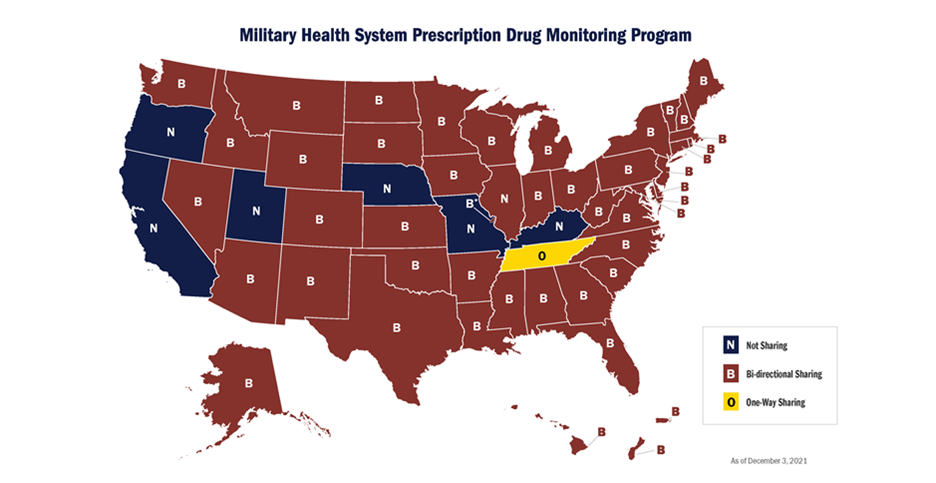Overview
The misuse and diversion of opioids and other controlled substances continues to result in addiction and deaths across the United States. An essential tool in fighting this epidemic has been implementing and using Prescription Drug Monitoring Programs (PDMPs).
PDMPs track controlled substance prescription information to include: drug name and strength, quantity, prescriber, pharmacy, and payment type. These programs aim to protect public health and safety, assist providers and pharmacists in identifying potential prescription medication misuse, and aid in preventing drug diversion.
The Military Health System (MHS) PDMP is an electronic database that collects prescription data on controlled medications dispensed to TRICARE beneficiaries within the MHS.
The goal of the MHS PDMP is to ensure a patient's complete controlled substance medication history is available to a prescriber or pharmacist regardless of where the medication is prescribed or dispensed (purchased/civilian care) or how the medication was paid for (via insurance, credit, or cash).
In accordance with 10 USC 1074(g): Pharmacy benefits program, the MHS PDMP enhances the management of prescribing opioids and supports providers in:
- Accessing the legitimate medical use of prescribed controlled substance medications;
- Identifying, deterring, or preventing drug misuse and diversion; and
- Recognizing patients who may be engaging in misuse of prescribed controlled substance medications and offering intervention and treatment.
Background
The Defense Health Agency (DHA) recognizes the need to share dispensing information of controlled substance medications at military pharmacies with civilian providers to ensure that a patient's complete controlled substance medication history is available to a prescriber or pharmacist regardless of where or how the patient had the prescription filled.
In January 2019, the MHS entered an agreement with the National Association of Boards of Pharmacy (NABP) to establish a connection with their Prescription Monitoring Program (PMP) Interconnect® SystemNABP PMP InterConnect, which allows for the transfer of prescription data across state lines. The MHS PDMP is the first non-state or territory PDMP permitted to become a part of NABP's Interconnect® System.
The DHA is committed to building a PDMP that connects with every state or territory. Each state or territory can decide if they only want to access (one-way sharing) or share (bi-directional sharing) their prescription data with the MHS PDMP.
The MHS PDMP is administered by the current TRICARE Pharmacy contractor, Express Scripts, Inc. They are responsible for validating and registering credentialed MHS providers and pharmacists, as well as their delegates. They are also responsible for updating the MHS PDMP data and ensuring data integrity.
Registration
Registration is required for many MHS providers and pharmacists.
MHS PDMP users will register with the required information:
- Government email (.mil or .gov)
- NPI number
- License number (or National Commission on Certification of Physician Assistants (NCCPA) for non-state licensed Physician Assistants)
- State of licensure (noted as home state when registering for the MHS PDMP)
- User Role (see Frequently Asked Questions for role descriptions and which roles are required to register)
Register for MHS PDMP
Other registration requests:
- MHS PDMP registration is not open to military law enforcement, public health officials, or veterinarians.
- Requests for MHS PDMP information may be submitted to the MHS PDMP Administrator for further processing in conjunction with the DHA legal department.
User Registration Process Tutorial
Heat Map

